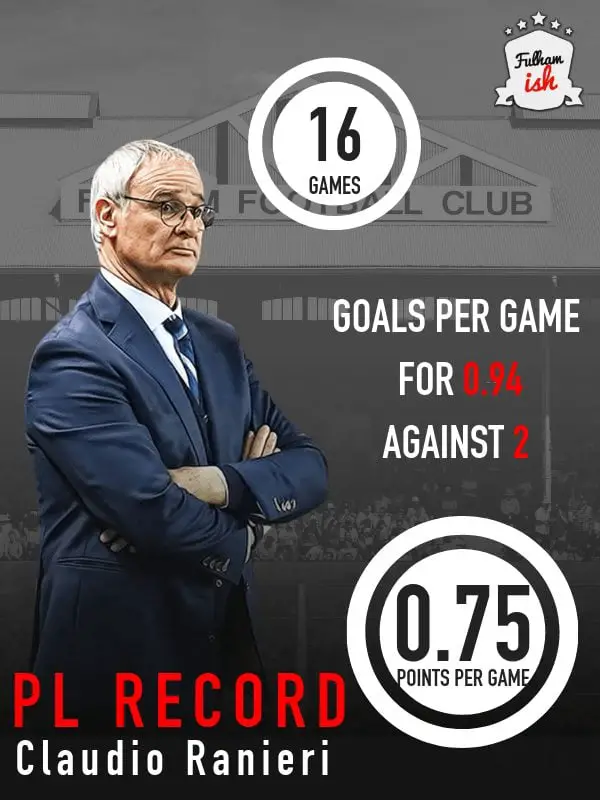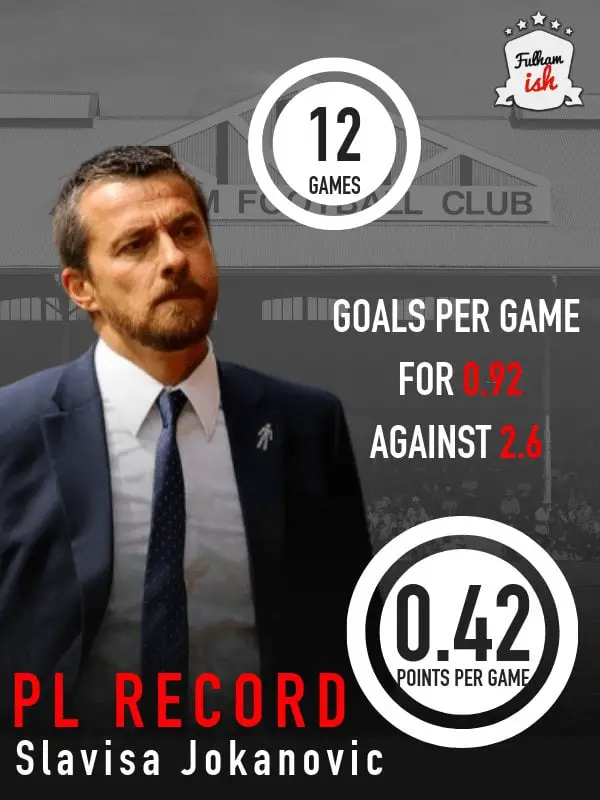Singer’s Corner: Ranieri vs Jokanovic
In the first of a brand new column series, our stat man George Singer compares our two managers this season – and how our fortunes changed as Ranieri was given the the keys to the Cottage.

So, to the delight of many, it’s finally happened: the Tinkerman has left the building, and in comes the Prince of passion Scotty Parker. The writing had been on the wall for a couple of weeks, and with Scotty at the wheel we seem to be on the right track to bring some positivity to the end of a frankly rubbish season.
Whilst I’m convinced it was the correct move to wave arrivederci to the Italian, I’m probably not alone in that I was initially excited by Ranieri’s appointment. After his previous heroics with relegation-candidates Leicester City, I thought he was the perfect man to give us the solid base required to start a push up into mid table. After watching his debut – a hard-fought victory at the Cottage against Southampton – I felt confident he would find that magic blend of defensive structure and attacking freedom to start finally putting points on the table.
In the end, we all know what actually happened. His tenure was short, and relatively disappointing, and leaves us effectively (if not yet mathematically) relegated.
Inevitable comparisons will be made between Claudio and his Slavic predecessor, so I thought I’d dig into the numbers a little to come up with my own opinion. Whilst we’ll never know for sure what would have happened if we’d stuck with Slavisa for the rest of the season, I wanted to try and analyse the effect that the managerial swap had on the squad, and who was the better fit for us in the Premier League.
Did Ranieri improve results?
At the end of the day, a football club is essentially a business. It has its own KPIs, and a strategy for how to improve these. And the most important one of these: points on the board. A team can play football in any way they like, but if they can’t get the results they need to stay up, everything else quickly becomes irrelevant.
If we take a look at these basic stats for both Claudio and Slavisa, there’s only really one winner:


Whilst he did have a slightly more favourable run of opponents (the average league position of his opponents was 10.8, compared to Slav’s 10.2), the numbers do suggest that Claudio was turning the club in the right direction. We were scoring more, conceding less, and earning more points per game.
When he joined the club, Ranieri was set a clear target by the Khans: keep Fulham in the Premier League. In his first press conference, he had a clear strategy to do this:
“As an Italian manager, the defensive way is the best method of the team. It is important to have a strong vision of how to work defensively”
These days, 40 points will comfortably keep a team up, so Claudio should have been looking to win just over a point per game to hit his target.
In reality, Ranieri wasn’t really able to bring us anywhere close to what we needed, and wasn’t able to shore up the defence as he promised. Whilst we were slightly more competent defensively, we still conceded 2 goals a game. In short, a bit better, but not nearly good enough.
Losing our footballing identity
Under Slavisa Jokanovic, particularly during our 23 game unbeaten run last season, we had a clear footballing philosophy at the club. We were “The Entertainers”. We were the “Barcelona of the Championship”. Yes, the standard of opposition wasn’t always great, but we knew week in week out we would be treated to attractive, positive and productive football. Both players and fans loved it.
We all knew that this would need to be tweaked in the Premier League, to counter some of the best squads in world football, but I couldn’t wait for us to take our swashbuckling football up to the Etihad, Anfield and Old Trafford.
For the first few games, this is exactly what we did. Whilst we weren’t as dominant as we were in the Championship, we started the season how we finished the previous: lots of short passes, building up play slowly, and starving the opposition of the ball. We were playing well, and fun to watch, but not getting the points we needed.
Over time, the lack of results became more and more of a pressing issue. Pressure quickly started to build, and it felt like we collapsed in on ourselves at the John Smith stadium. Despite flooding the midfield with naturally gifted passers of the ball, we couldn’t string two passes together, and resorted to hoofing the ball long to Mitrovic. A sign that the players had given up with Slavisa’s ways?
After the loss to Liverpool, Shahid pulled the trigger. In came Claudio, and out went the brand of football we had become accustomed to. Within a couple of weeks, it felt like he’d undone 2 and a half years of work on the training ground – and our attack was reduced to getting the ball forward to Mitrovic as fast as possible. We had lost our attractive identity, and it had been replaced by a confused, direct mess of a strategy.
When the players have been brought in for a particular style of football, and are being told to play in a completely opposite fashion, they’re not going to be at their best. They’re going to be confused as to what they need to do, and frankly this is understandable. Claudio, on arrival, was praised on his ability to build a tactical system around his players. In reality, he tried to squeeze our square players into round holes – and it never really worked.
So… Slavisa or Claudio?
In football, as in many areas of life, things are not black and white. Things are complex, don’t have a definitive answer, and the key in reality is finding the right balance. For us, this meant we needed to find the right balance of both enjoyable footballing identity and results. In practice, our two managers were only able to bring one each, and both left in disheartening fashion.
Don’t get me wrong, clearly both men are quality managers. After all, Slavisa did get us promoted, and Claudio won the League with Leicester. They could both be stubborn, and could isolate fan favourites, but talented men nonetheless.
The main issue I have here is the stark difference in footballing styles between them. The whole purpose of having a sporting director, is that they employ a head coach to deliver a style of football which runs through the veins of a club. This should flow through from the top to the bottom of the club, and shouldn’t significantly change with a new manager coming in.
Thinking back, the managers we reportedly spoke to before hiring Claudio were Quique Sanchez Flores, Arsene Wenger and Andre Villas Boas. Big names, yes, but no consistent style of football. In reality, all of them would have had teething problems adapting the team to their style, and would have resulted in a similarly disappointing tenure.
The solution? Have a style of football and stick to it. Less time needed to adapt to a new style, less need for new players, and fewer disgruntled players. Something for the Khans to think about when they make their next appointment.




